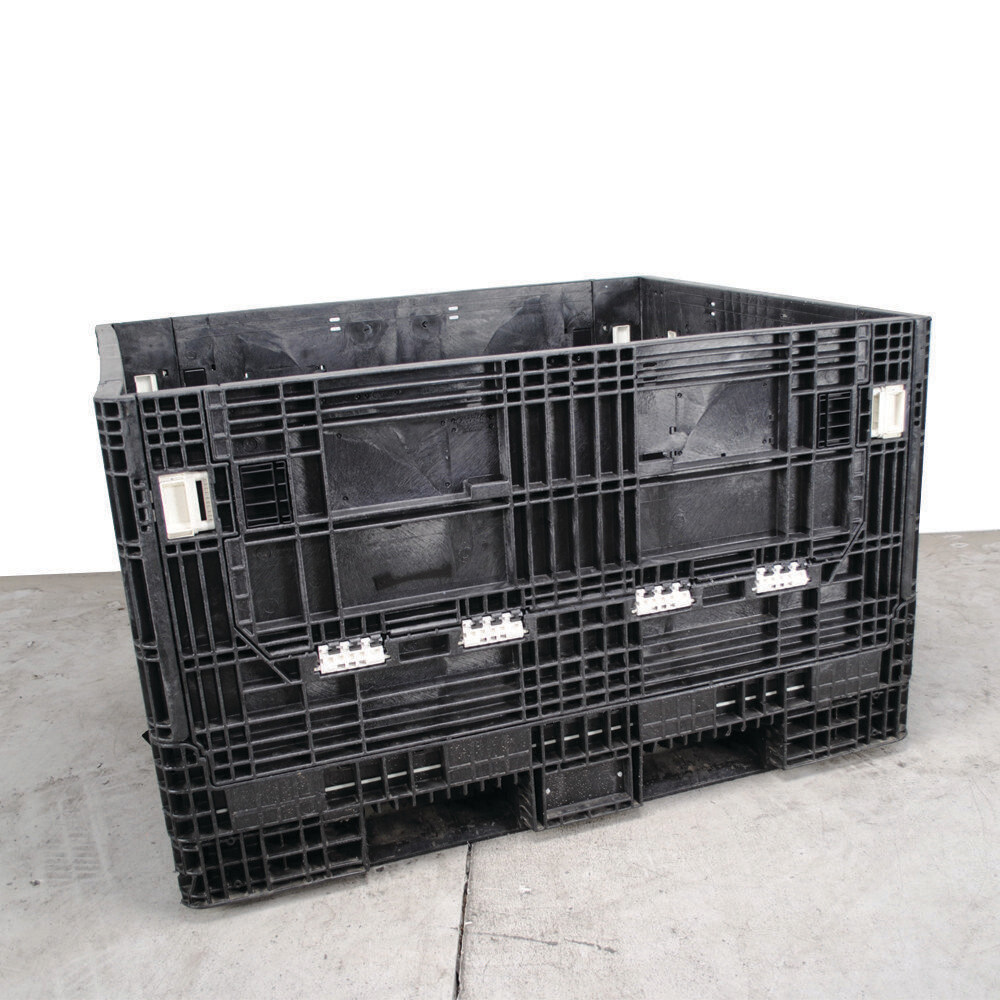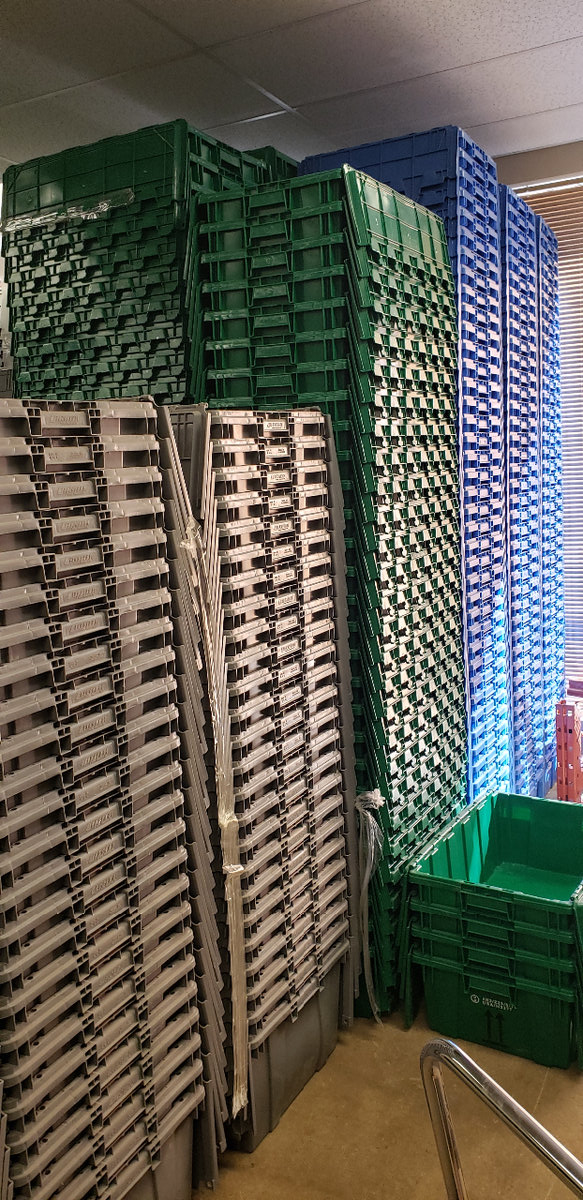Discovering the Advantages of Utilizing Bulk Containers in Modern Supply Chains
Making use of mass containers in modern supply chains presents a series of advantages that are worthy of careful consideration. These containers can bring about substantial price financial savings while enhancing logistical effectiveness. They likewise play a vital role in decreasing product packaging waste and boosting storage space remedies. As industries significantly prioritize sustainability, the possible influence of mass containers comes to be also much more pertinent. What specific benefits can be realized by adopting this method?
Expense Savings Through Bulk Handling
Mass handling supplies considerable price financial savings for organizations within modern-day supply chains. By utilizing bulk containers, firms can decrease packaging expenses considerably, as less products are needed for transport and storage. This decrease in packaging not just decreases expenses but also lessens waste, aligning with sustainability goals. In addition, bulk handling enables a lot more effective transportation, as larger volumes can be delivered in less trips, resulting in decreased products prices.
Labor prices also see a decrease; mass products typically need less manual handling, allowing staff to concentrate on other value-added jobs. Furthermore, the streamlined storage space of bulk containers optimizes storage facility space, resulting in possible cost savings in operational or rental costs. Generally, applying bulk handling techniques can considerably boost a company's profits, making it an attractive option for organizations seeking to boost their cost efficiency in an open market
Improved Performance in Logistics
While conventional supply chain approaches usually involve fragmented processes, the integration of bulk containers significantly improves logistics efficiency. These containers promote the structured movement of products, decreasing dealing with times and decreasing the requirement for multiple transfers. By combining materials into fewer shipments, business can optimize transportation paths and reduce total products prices.

The boosted exposure offered by bulk logistics makes it possible for real-time monitoring of deliveries, permitting supply chain managers to respond promptly to any type of interruptions. Overall, the adoption of bulk containers transforms logistics operations, promoting a much more responsive and nimble supply chain that meets the demands of modern-day commerce.
Decrease of Product Packaging Waste
As firms look for to improve sustainability in their operations, making use of bulk containers plays an essential duty in minimizing product packaging waste. Typical packaging approaches often include numerous layers, resulting in significant waste, both in materials and disposal. By making use of bulk containers, organizations can notably reduce the quantity of packaging needed, as these containers are designed to be recycled and reused. This shift not only decreases the volume of single-use product packaging sent out to land fills however also reduces the carbon footprint related to production and transporting product packaging products. Furthermore, mass containers facilitate much more effective loading processes, enabling a higher amount of items to be carried at the same time, thus reducing the requirement for excessive product packaging. Inevitably, taking on bulk containers causes a much more sustainable supply chain, lining up functional experiment ecological obligation while also possibly minimizing costs related to packaging waste administration.
Enhanced Storage Space Solutions
Reliable storage options are crucial for maximizing supply chain efficiency, especially when mass containers are used. These containers optimize area application, enabling for higher density storage space. Their consistent dimensions allow piling, which minimizes the impact required in storehouses and warehouse. This organization not only boosts ease of access but also improves inventory management.
Furthermore, bulk containers can be created to suit various products, from fluids to solids, thus using adaptability in storage space alternatives. Their durable building and construction guarantees toughness, decreasing the threat of damage throughout handling and transportation. Subsequently, services can experience fewer disturbances and reduced replacement costs.
Moreover, the standardization of mass containers assists in less complicated assimilation into automated storage space and access systems, additionally enhancing operational efficiency. To conclude, the fostering of bulk containers causes improved storage space remedies that support streamlined procedures and contribute positively to general supply chain efficiency.

Advertising Sustainability in Supply Chains
Advertising sustainability in supply chains has actually come to be an important focus for businesses looking for to minimize their ecological effect. The adoption of mass containers functions as a pivotal approach for enhancing sustainability efforts. These containers, designed for reliable storage space and transport, considerably decrease product packaging waste contrasted to conventional packaging approaches. By using durable website products, bulk containers can be reused multiple times, better lowering the demand for single-use product packaging.
Additionally, mass containers optimize logistics by taking full advantage of space usage during transportation, thus reducing carbon exhausts connected with delivery. Organizations can likewise enhance their supply chain processes, which adds to lowering power intake. In addition, firms that focus on sustainability frequently enhance their brand name credibility, appealing to environmentally mindful customers. Overall, integrating bulk containers into supply chains not just promotes environmental duty yet additionally promotes functional performance, showing a comprehensive technique to sustainable organization practices.
Frequently Asked Concerns
What Types of Products Are Best Suited for Mass Containers?
Products best fit for mass containers include grains, chemicals, fluids, and huge elements. These products take advantage of effective storage, transportation, and lowered packaging waste, ultimately improving functional efficiency and cost-effectiveness within supply chain procedures.

Exactly How Do Mass Containers Influence Stock Administration Practices?
Mass containers simplify stock monitoring by reducing maximizing and dealing with times storage space. They boost visibility of stock levels, simplify tracking, and promote more exact projecting, eventually bring about improved effectiveness and reduced functional prices.
Exist Particular Industries That Advantage A Lot Of From Bulk Containers?
Particular markets, such as farming, chemicals, and food handling, advantage most from bulk containers. refurbished bulk containers. These sectors make use of bulk containers to improve effectiveness, lower costs, and enhance logistics, inevitably streamlining their supply chain procedures considerably
What Are the Safety And Security Considerations When Using Mass Containers?
Safety factors to consider when using mass containers consist of ensuring architectural honesty, proper handling techniques, secure loading and discharging processes, normal inspections for leaks or damages, and compliance with relevant regulations to mitigate threats throughout transport and storage space.
How Can Companies Change to Mass Container Solutions Efficiently?
Companies can successfully change to bulk container systems by reviewing existing logistics, training team, gradually carrying out the brand-new system, examining vendor abilities, and continually keeping track of performance to assure performance and security throughout the process. (used collapsible bulk containers)
The use of mass containers in contemporary supply chains provides a variety of advantages that are worthy of mindful factor to consider. By using bulk containers, firms can minimize packaging prices substantially, as less products are needed for transport and storage space. While typical supply chain approaches frequently entail fragmented processes, the assimilation of bulk containers greatly boosts logistics efficiency. By utilizing mass containers, businesses can especially lessen the quantity of product packaging required, as these containers are developed to be reused and recycled. Efficient storage space options are necessary for optimizing supply chain effectiveness, particularly when bulk containers are utilized.